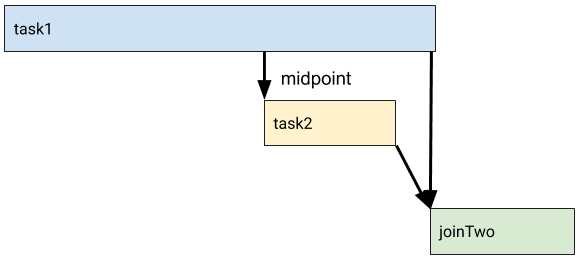keeping promise in sbt
build.sbt is a DSL for defining a task graph to be used for automatic parallel processing. The message passing among the tasks are expressed using something.value macro, which encodes Applicative composition (task1, task2) mapN { case (t1, t2) => .... }.
One mechanism I’ve been thinking about is allowing some long-running task1 to communicate with task2 midway.

Normally, we would break down task1 into two subtasks. But it might not be as straight-forward to implement such thing. For example, how would be tell Zinc to compile something halfway, and resume later? Or tell Coursier to resolve, but fetch later?
As a starting point, we could think of a solution where task1 generates some JSON file, and task2 can try to wait until the file appears, and read from it. We can improve this by replacing JSON file with a concurrent data structure, such as Promise[A]. Still there’s the complication of waiting. sbt limits the number of tasks that would run in parallel, and it would be wasteful to use a slot for waiting. Daniel’s Thread Pools post is informative in this regard. What we have is a blocking IO polling that won’t do any work.
Def.promise
I’ve implemented a wrapper around scala.concurrent.Promise called Def.promise. Here’s an example usage:
val midpoint = taskKey[PromiseWrap[Int]]("")
val longRunning = taskKey[Unit]("")
val task2 = taskKey[Unit]("don't call this from shell")
val joinTwo = taskKey[Unit]("")
// Global / concurrentRestrictions := Seq(Tags.limitAll(1))
lazy val root = (project in file("."))
.settings(
name := "promise",
midpoint := Def.promise[Int],
longRunning := {
val p = midpoint.value
val st = streams.value
st.log.info("start")
Thread.sleep(1000)
p.success(5)
Thread.sleep(1000)
st.log.info("end")
},
task2 := {
val st = streams.value
val x = midpoint.await.value
st.log.info(s"got $x in the middle")
},
joinTwo := {
val x = longRunning.value
val y = task2.value
}
)
First, we create a PromiseWrap[Int] task called midpoint. This is still a task because we need a fresh promise for each command invocation. Next we have longRunning task, which completes the promise halfway. task2 depends on midpoint.await.value. This means that sbt’s task scheduler won’t start task2 until midpoint promise is completed.
To run both longRunning and task2 together, we define joinTwo task. This runs as follows:
sbt:promise> joinTwo
[info] start
[info] got 5 in the middle
[info] end
As you can see above, we were able to run both tasks in parallel while letting longRunning task pass message to task2.
Warning: If you call task2 from the shell, it will be blocked forever and will not return. You’d have to Ctrl-C to cancel out of it.
summary
Def.promise sbt/sbt#5552 is a draft proposal to allow long-running tasks to pass message to another task. One of the potential use case for this is pipelining of subproject compilations.